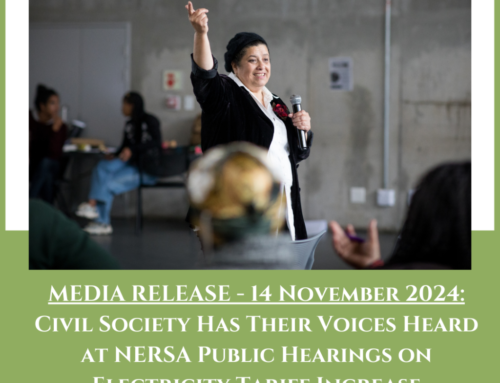As the 30-day public consultation process on SA’s draft second Nationally Determined Contribution (NDC) is set to close with the 29 August deadline for written comment, civil society organisations are calling for substantial revisions to strengthen the ambition, coherence, and accountability provisions of our multilateral commitments to climate action.
Organisations affiliated with the Climate Justice Coalition (CJC) and the Energy Governance South Africa Network (EG-SA), including social justice NGOs, youth, faith-based, and grassroots movements, say that the current draft does not sufficiently address the climate crisis or fulfil the country’s constitutional and international obligations.
Setting the mitigation component of SA’s NDC – particularly the GHG emissions reduction objective to 2035 – is a crucial opportunity for policy contestation, given that domestic policy elaboration under the Climate Change Act is barely moving and our long-faltering energy planning processes are in limbo. As noted by the Presidential Climate Commission (PCC), in draft recommendations published in June: “South Africa’s NDC must substantially increase both ambition and implementation readiness to respond to escalating climate risks…” and “… must include time-bound, system-specific targets for key sectors…
The emissions targets proposed by the Department of Forestry, Fisheries and Environment (DFFE) are not adequate or appropriate, given the country’s high historic emissions and current position as 13th highest emitter in the world. Interventions listed for adaptation are generic and unquantified, without clear provisions to support those most vulnerable to the harsh realities of the climate crisis. There is little mention of loss and damage and no robust monitoring and evaluation mechanisms for tracking progress, or financial flows. The draft document reflects, rather than seeking to remedy, fragmented climate governance.
Insisting that the NDC must be coherent and aligned with South Africa’s Framework for a Just Transition and the commitment to net zero emissions in 2050, the organisations signed on below dispute the assertion that the draft “represents our highest possible ambition, in the context of equity”.
They warn that misalignment leaves the country vulnerable and at risk to legal challenges. Court cases such as: Deadly Air and #CancelCoal affirm the government’s constitutional duty to protect the right to a healthy environment. Internationally we have the International Court of Justice’s recent advisory opinion on climate obligations and emerging rulings from the African Court on Human and People’s Rights.
Civil society organisations are thus calling for:
- more ambitious and sector-disaggregated mitigation targets, that fairly reflect our national responsibility and capabilities and will justify the international support being sought;
- adaptation measures to be clearly defined and designed to protect marginalised groups and communities, and to channel more climate finance to adaptation implementation;
- dedicated mechanisms to address loss and damage with transparency and accountability;
- monitoring and evaluation systems to be detailed and publicly accessible.
As NDCs are submitted – by all signatories to the Paris Agreement – on a five-year cycle, setting detailed and ambitious objectives in the document (to be submitted ahead of this year’s climate negotiations – COP 30) should be a key driver for broader consistency across all development planning and for policy harmonisation.
“While the DFFE’s public participation process is overdue and rushed, it must nevertheless be inclusive, open to making improvements, and informed by release of the research studies referenced therein,” states the CJC’s Gabriel Klaasen.
“The NDC must be based on justice, science, and the lived realities of people in South Africa. We must ensure that it serves the needs of people, planet, and future generations to come.”
//ENDS
For the editor:
For media enquiries, contact:
Shaazia Ebrahim
Digital and Communications Specialist, Climate Justice Coalition
comms@climatejusticecoalition.org
+27833202255
About The Climate Justice Coalition: The Climate Justice Coalition (CJC) is a South African coalition of trade unions, civil society, grassroots, and community-based organisations. Together we are taking on the climate crisis by advancing a transformative climate justice agenda, which works to overcome the deep inequality, poverty and multiple injustices that South Africa faces.
About Energy Governance South Africa: Energy Governance South Africa (EGSA) is a network of civil society organisations and individuals dedicated to promoting transparent, inclusive and accountable decision-making in the energy sector.






